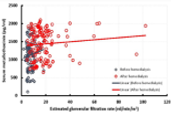Abstract
Metallothioneins (MTs) are intracellular metal-protein which not alone have inactivated heavy metals but also have traced elements while improving the antioxidant status. Serum levels of some heavy metals and trace elements showed toxic levels in the end-stage renal failure. This study is aimed to determine the serum level of metallothionein in patients with chronic kidney disease (CKD) and to show the effects of hemodialysis on its level. This cross-sectional study included 125 patients with CKD managed with regular hemodialysis. Estimated glomerular filtration rate (eGFR) was calculated by using the Cockroft and Gault equation adjusted to the body surface area (ml/min/m2), and 4 variable modified diet in renal disease (4-v MDRD) equation (ml/min/1.73m2). The mean ± SD of serum metallothionein was significantly less than the corresponding level of healthy subjects (1113.4±289.5 pg/ml versus 1536.0±341.4 pg/ml). Hemodialysis improves the serum level of metallothionein to attain 1437.6±406.1 pg/ml. There is a non-significant correlation between serum metallothionein with the eGFR and hemodialysis did not produce a significant effect on the correlation between serum metallothionein with eGFR. We conclude that serum metallothionein level is a useful prognostic marker for CKD and hemodialysis plays a role in the recovery of serum metallothionein level.
Full text article
Authors

This work is licensed under a Creative Commons Attribution-NonCommercial-NoDerivatives 4.0 International License.

